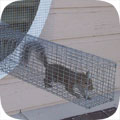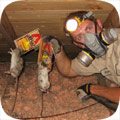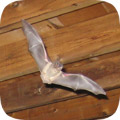- flemingisland@wildlifeanimalcontrol.com
Call 24/7 for a free quote:
904-414-5022
Fleming Island Wildlife Animal Control
Professional Wildlife Removal Company Servicing Fleming Island, FL
If you have a problem with wildlife in your Fleming Island home, your best option is to hire a company that specializes in Florida wildlife removal only. This is a specialty business, and regular pest control companies do not use the proper techniques to solve animal problems. I have spent many years reviewing Florida and Fleming Island, and I recommend the following:
Professional Wildlife and Rodent Removal
Cell Phone: 904-414-5022
NOTE: If you have a dog or cat problem, call Clay County Animal Services: (904) 269-6342

Professional Wildlife and Rodent Removal specializes primarily in removing animals from attics of homes and buildings - this includes squirrels in attics, raccoons, and rats or mice in homes. Florida also has a documented problem with
bats in buildings, and Professional Wildlife and Rodent Removal is specially trained in bat removal. They also perform general wildlife trapping services, such as the capture and removal of skunks or opossums on the
property. Call 904-414-5022 to discuss your critter problem and schedule a same-day or next-day appointment. Click here to learn more about
what prices we charge in 2025.
When hiring a company to solve your wild animal problem, you want these features:
- Specializes in wildlife removal, not pest control
- Fully Florida and Clay County licensed and insured
- Works 7 days per week (critters don't take weekends off)
- Performs full building inspections: enters and inspects attic
- Performs exclusion repairs, with guarantee against animal re-entry
- Offers cleanup of biohazardous wildlife waste
Professional Wildlife and Rodent Removal is a full-service Fleming Island wildlife removal company. This is very different from a regular Fleming Island pest control company. The pest control companies spray poison to kill insects. This is not at all
similar to wildlife removal. Professional Wildlife and Rodent Removal performs a full inspection of the home or property, and determines why the animal(s) are there, and if inside a building, how the animals got inside. All
animals (including rodents) are trapped and removed, or if possible, removed from the building using special exclusion devices. Once the animals are gone, preventative repairs are essential, and
cleanup is sometimes recommended.
 Fleming Island wildlife trapping - it's not as simple as it may seem. It's illegal in Florida to trap without a license. Trap type is very important and there are many different types, bait is somewhat relevant, trap placement
is vital, and there are dozens of small things that are very important to know.
Safety is a concern. Then once the animal is trapped, it must be removed and dealt with in the proper manner according to Florida law. We offer Fleming Island raccoon removal. Read more about how to get rid of raccoons.
Fleming Island wildlife trapping - it's not as simple as it may seem. It's illegal in Florida to trap without a license. Trap type is very important and there are many different types, bait is somewhat relevant, trap placement
is vital, and there are dozens of small things that are very important to know.
Safety is a concern. Then once the animal is trapped, it must be removed and dealt with in the proper manner according to Florida law. We offer Fleming Island raccoon removal. Read more about how to get rid of raccoons.
 Animals in attics - this is our specialty at Professional Wildlife and Rodent Removal. Many types of animals like to live in attics. This includes squirrels, raccoons, rats, mice, bats, birds, and even possums. Critters like to go into attics for a safe place to live
and raise their young. Removing animals from attics is very complex work, partly because of the presence of baby animals. If you need Fleming Island squirrel removal, we can remove all the squirrels from your attic, and seal out any future ones. Read more about how to get rid of squirrels.
Animals in attics - this is our specialty at Professional Wildlife and Rodent Removal. Many types of animals like to live in attics. This includes squirrels, raccoons, rats, mice, bats, birds, and even possums. Critters like to go into attics for a safe place to live
and raise their young. Removing animals from attics is very complex work, partly because of the presence of baby animals. If you need Fleming Island squirrel removal, we can remove all the squirrels from your attic, and seal out any future ones. Read more about how to get rid of squirrels.
 Rodent control must be done in a very specific way. First off, the most important thing is that all the openings that rats and mice can use to enter a house be sealed. Then all the rodents must be physically trapped and removed.
Never, ever use poison! Most Fleming Island exterminators will just use this lazy poison technique to kill rodents, and it causes more harm than good - dead stinky rats, and it doesn't solve the problem. Call us for correct Fleming Island rat removal. Read more about how to get rid of rats.
Rodent control must be done in a very specific way. First off, the most important thing is that all the openings that rats and mice can use to enter a house be sealed. Then all the rodents must be physically trapped and removed.
Never, ever use poison! Most Fleming Island exterminators will just use this lazy poison technique to kill rodents, and it causes more harm than good - dead stinky rats, and it doesn't solve the problem. Call us for correct Fleming Island rat removal. Read more about how to get rid of rats.
 Bat removal is a highly specialized task. Florida is known to have colonizing bats who often live in buildings. Bats love attics. If not removed, the colony can grow to a very large size over the years. The bat droppings are often corrosive and
cause health risks. The same goes for bird droppings on or in buildings. We perform Fleming Island pigeon removal and bird control. But our specialty is Fleming Island bat removal. We remove 100% of the bat colony and seal the building so that it's totally bat-proof. Read more about how to get rid of bats.
Bat removal is a highly specialized task. Florida is known to have colonizing bats who often live in buildings. Bats love attics. If not removed, the colony can grow to a very large size over the years. The bat droppings are often corrosive and
cause health risks. The same goes for bird droppings on or in buildings. We perform Fleming Island pigeon removal and bird control. But our specialty is Fleming Island bat removal. We remove 100% of the bat colony and seal the building so that it's totally bat-proof. Read more about how to get rid of bats.
 If you have animals inside a house, no job is complete without proper exclusion repairs. If you simply hire a Fleming Island trapper who only removes the critters, then the problem will return. You need to hire a Fleming Island wildlife control company that identifies 100% of the animal entry points
into your building, and seals them shut with professional repairs. In addition, in many cases animals have left waste or contamination behind, and you'll want a company that can provide professional cleaning services. Professional Wildlife and Rodent Removal does both.
If you have animals inside a house, no job is complete without proper exclusion repairs. If you simply hire a Fleming Island trapper who only removes the critters, then the problem will return. You need to hire a Fleming Island wildlife control company that identifies 100% of the animal entry points
into your building, and seals them shut with professional repairs. In addition, in many cases animals have left waste or contamination behind, and you'll want a company that can provide professional cleaning services. Professional Wildlife and Rodent Removal does both.
The above are just some of the services offered by Professional Wildlife and Rodent Removal. We also trap and remove animals that destroy lawns, such as moles, or digging animals. Sometimes animals like opossums will live under buildings, steal pet food, raid garbage cans, etc.
Read about how to get rid of opossums. Skunks commonly live under sheds or decks, and set up a den. We can trap and remove them without them spraying. Read about how to get rid of skunks. Professional Wildlife and Rodent Removal
also provides dead animal removal in Fleming Island. If you need help with any other wildlife conflict, from a fox, beaver, groundhog, or any other critter, we can solve it. We also do Fleming Island snake removal - most of the snakes in Florida are not venomous, but
call us if you want safe removal, or read about how to get rid of snakes in Fleming Island. And remember, we are a private business, not Clay County Animal Control Services, so if you have a dog or cat problem, call the County at (904) 269-6342.
Clay County animal services does not handle any wildlife issues.
Professional Wildlife and Rodent Removal
Cell Phone: 904-414-5022
Fleming Island Pricing Info
Every wildlife removal situation is different, from the species of animals involved, the location of the animal inside a house or outside, the extent of repairs or cleanup, etc. It's impossible to give one-size-fits-all prices. Examples MIGHT include:Small Job: For example, a one-stop job to remove an animal in the yard: $100 on up
Medium Job: For example, getting critters out of your house with minor repairs: $300 on up
Large Job: For example, a project involving many service trips and complex work: $500 on up
Give us a phone call now and tell us about your wildlife issue and we will be able to give you a price estimate over the phone. If you're cool with it, we can schedule a same-day or next-day appointment if you like. Our prices are fair, and a good value because we do the job right, the first time.
Fleming Island Wildlife Tip #1:
How Mice Communicate Using Pheromones
Mice are social creatures, and they keep on living in large colonies within marked territories. They stay connected to other group members in the area and keep on sharing information with each other. Mice have their own way of telling things to each other, and human beings cannot understand their language. Moreover, these tiny creatures can use different methods for communication by involving their mouth, noses, ears, and bodies as well.
Note that mice do vocal communication as well, but humans can only hear squeaks without understanding what mice are actually saying. They have voice range quite lower as compared to the ability of human ears. You will be surprised to know that mice can also communicate with each other via using scent trails. One popular method of communication followed by most rodents including mice is pheromones. Note that pheromones are actually some chemicals that mice release from their body to trigger some kind of response for other animals of its group. Most of the time it is an indication more other mice to follow the same path to reach the target destination. These pheromones form an invisible track that can be followed by other mice, but humans cannot locate it. Hence, in order to keep your premises safe from their secret conspiracy, it is important to take immediate steps to get rid of these creatures.
Mice are also capable enough to use their urine to communicate with each other. Experts reveal that mice can release pheromones with their urine as well and it sometimes accompanies other chemicals as well. Other mice can follow these tracks to know information about the best possible food sources in the area as well as to find safe locations to bread and build nests for the babies. Note that some dominant male members in the group have the ability to leave strong scent with their urine than other mice cannot release.
Other than this, mice also make use of body language to communicate their emotions to each other, but these movements can be understood by species of the same category only. they can express the feeling of aggression and fear to each other. Experts say that when a mouse wags the tail, it shows the sign of aggression. Whenever the male mice start a fight in aggression to show dominance and to express the right to mate with a female, they use this activity. They warn other mice in the area to fight by wagging their tail. In most cases, the younger and weaker mice simply move away to avoid the fight, but the dominant ones will wag it back, and they will initiate a fight. Mice sometimes also spend the time to groom each other, and it is their way to show the friendliness towards each other. If you find one mouse moving in your house, there are chances to have many hidden behind because these creatures usually live in groups and prefer to communicate all information about surrounding area to each other.
Fleming Island Wildlife Tip #2:
Florida Wildlife Information:
Florida State bird: Northern mockingbird
State mammal: Florida panther, manatee, dolphin
State reptile: Loggerhead sea turtle
State fish: Florida largemouth bass, Atlantic sailfish
State insect: Zebra longwing
Florida's climate is hot and damp, making it a prime place for reptiles, amphibians, and other semi-aquatic animals. There are a good number of raccoons, rabbits, squirrels, and rats, and it seems these common pest creatures plague homeowners in almost every state. In addition to the common property visitors, Florida also has four venomous snake species: rattlesnakes, cottonmouths, coral snakes, and copperheads. Because of how warm the state is, snakes are often out sunning themselves pool side. All reptiles are drawn to water, and because of the constant warm temperatures, many homes in Florida have pools.
Snakes aren't the only creatures invading yards. Armadillos in Florida are capable of coming into a yard and digging a burrow in one night. While they rarely, if ever, invade the home itself, the damage these creatures can cause to a yard is impressive. If you've got to have one or the other, however, most people would take the armadillo over the snakes.
While almost tropical in its climate, Florida is home to a massive expanse of swamp land known as The Everglades National Park. This huge plot of land is home to alligators, turtles, lizards, raccoons, rabbits, and snakes. The red tailed boa now makes the park its home, though the snake is not a native species of North America. This has caused some concern with the local wildlife authorities, as populations of smaller mammals have been steadily declining due to predation by the large serpents. It is expected that alligators and Florida panthers will eventually become prey for the invading species.
Land-loving predators that are sometimes nuisances are primarily black bears. These large, intimidating animals have learned how easy it is to pick through human garbage and to raid campsites. It only takes a bear one or two successful raids before it becomes problematic. Coyotes are also a common nuisance predator in the state. Like the bears, coyotes become opportunistic, feeding off of livestock, pets, and human refuse.
The population of Florida is growing annually, and it is a popular state for retirees. Eventually, more and more people will displace the animals of Florida, causing clashes. A good example of this is with the alligator population, which lives in many of the waterways, regardless of how close to human civilization. The alligators aren't fearful, so they hold their ground and usually must be removed by professionals.
You can always call Professional Wildlife and Rodent Removal, any time of day, at 904-414-5022, for a price quote for Fleming Island wildlife control services. I am confident that this is the best choice amongst wildlife removal companies in Fleming Island, FL.







































